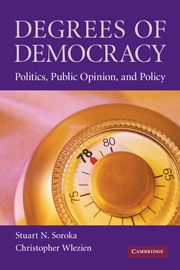Book contents
- Frontmatter
- Contents
- Preface
- Degrees of Democracy
- 1 Public Opinion and Policy in Representative Democracy
- 2 The Thermostatic Model
- 3 Adding Issues and Institutions
- 4 Public Preferences and Spending
- 5 Parameters of Public Responsiveness
- 6 Public Responsiveness Explored
- 7 Policy Representation
- 8 Disaggregating Public Responsiveness and Policy Representation
- 9 Degrees of Democracy
- Appendix
- Bibliography
- Index
8 - Disaggregating Public Responsiveness and Policy Representation
Published online by Cambridge University Press: 05 June 2012
- Frontmatter
- Contents
- Preface
- Degrees of Democracy
- 1 Public Opinion and Policy in Representative Democracy
- 2 The Thermostatic Model
- 3 Adding Issues and Institutions
- 4 Public Preferences and Spending
- 5 Parameters of Public Responsiveness
- 6 Public Responsiveness Explored
- 7 Policy Representation
- 8 Disaggregating Public Responsiveness and Policy Representation
- 9 Degrees of Democracy
- Appendix
- Bibliography
- Index
Summary
Preceding chapters have demonstrated that policy does represent preferences, and that preferences in turn respond to policy change. We have thus far not examined exactly who is responding and being represented, however – we have been concerned almost entirely with the public taken as a whole, the “macro” public. We consequently know relatively little about what is happening beneath the surface. Take public responsiveness to policy: Do all people respond? Or does the tendency vary across groups? Does the pattern vary across issues? These questions are not only interesting in themselves; they are also especially important because of their potential consequences for opinion representation. If only certain segments of the public are paying attention, after all, then there is reason to think that policymakers may only represent the opinions of those segments. Just as for public responsiveness, we know relatively little about heterogeneity in policy representation. Do governments respond to all citizens equally? Or are some groups better represented than others? Does the representation of subgroups vary across domains? Each of these questions is addressed empirically in the current chapter.
ON EQUALITY
“Procedural equality” – where “the political preferences expressed by each citizen receive equal weight in the decision-making process” (Beitz 1990) – is a central tenet of democratic theory. Indeed, considerations of equality and democracy have been critically intertwined at least since Rousseau's treatises on government, in large part because while most versions of democracy require a certain degree of equality, exactly how much and what kind of equality is open to debate.
- Type
- Chapter
- Information
- Degrees of DemocracyPolitics, Public Opinion, and Policy, pp. 145 - 167Publisher: Cambridge University PressPrint publication year: 2009



